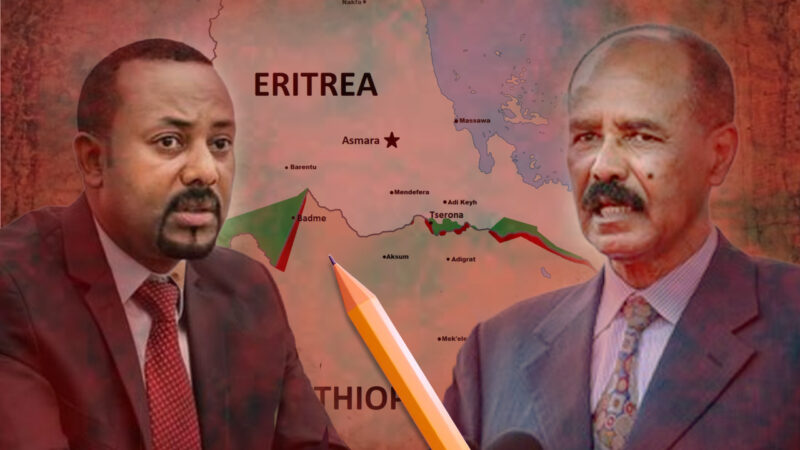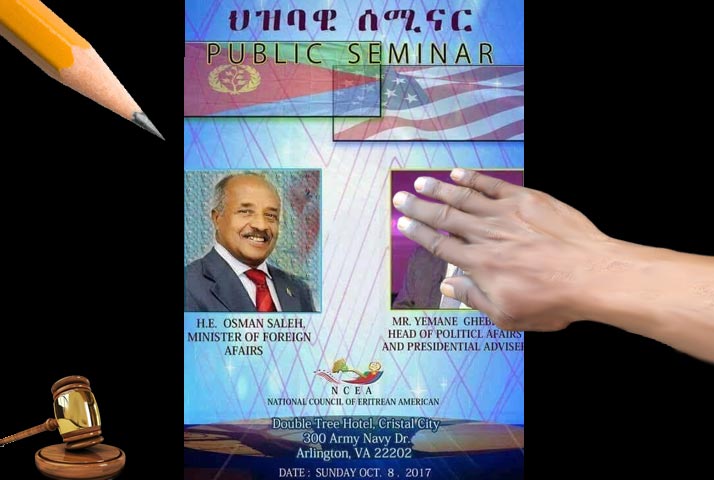Will they make peace?

Culturally, Abyssinia still clings to its archaic, arguably primitive, mindset. Attempts at modernization have not yielded the needed results. From early on, the developed West has portrayed the nation as a Christian island amidst a Muslim sea. But the unlimited support and goodwill the developed West provided didn’t help much.
Since the Middle Ages, the myth of Prester John has been implanted in the Western psyche, thus the historical obsession with Abyssinia. Equipped with the Prester John myth, Europeans relentlessly pursued their goal of dissolving the Muslim Sea and making room for missionary work.
Gradually, the baptism of old Abyssinia with a new name, Ethiopia, encouraged many Western countries to swarm the country. Their pretext of finding the mystical Prester John proved futile. But enabling Abyssinia with military and diplomatic muscles continued from the days of the Jesuits to the USA. But the siege mentality that such interferences created among the people lived on until the region ushered in the era of Abiy Ahmed, who considers himself the mythical Seventh King.
Abiy didn’t create many of the Ethiopian national crises that he inherited, but he made them worse. As if to outdo the past recklessness of the old times, he added fuel to the fire.
From 1998-2000, Ethiopia and Eritrea fought a devastating border war that cost the two nations about 100,000 lives, about a million displaced souls, many destroyed villages, and shattered dreams and livelihoods. The youth of the region lost the most as their destiny was held hostage by ambitious dictators. It was bleak and became bleaker as the only meaning of life became killing and dying in a meaningless war or perish attempting to escape the hell the region has become.
 On December 12, 2000, Ethiopia and Eritrea signed the Algiers peace treaty, based on which the Permanent Court of Arbitration reached a decision. But the decision is still collecting dust, as the two sides expressed their reservations about the ruling. While Eritrea insisted that the ruling be implemented as is, Ethiopia dragged its feet and asked for more dialogue to iron out some details it deemed important. The political and intellectual class of the region was divided between two opinions: those who saw a need for further dialogue and those who wanted the ruling to be implemented. Neither of the two governments was willing to change its mind. That standstill led to over two-decades of “no war, no peace.” In 2018, Abiy Ahmed took power and demolished much of the foundations laid before his assuming power.
On December 12, 2000, Ethiopia and Eritrea signed the Algiers peace treaty, based on which the Permanent Court of Arbitration reached a decision. But the decision is still collecting dust, as the two sides expressed their reservations about the ruling. While Eritrea insisted that the ruling be implemented as is, Ethiopia dragged its feet and asked for more dialogue to iron out some details it deemed important. The political and intellectual class of the region was divided between two opinions: those who saw a need for further dialogue and those who wanted the ruling to be implemented. Neither of the two governments was willing to change its mind. That standstill led to over two-decades of “no war, no peace.” In 2018, Abiy Ahmed took power and demolished much of the foundations laid before his assuming power.
In what was termed a landmark visit, in July 2018, Abiy made a surprise visit to Asmara and met with Isaias Afwerki. The two leaders announced a peace agreement they reached to resolve all pending issues between the two countries. The ceremony of signing the agreement was repeated in Abu Dhabi under the auspices of Sheikh Mohammed Bin Zaid of the UAE and signed once more in Jeddah under the auspices of King Salman of Saudi Arabia.
However, no details of the agreement were given to the citizens of the two nations; they got heavy doses of propaganda instead. To date, the people on whose behalf the agreements were signed are oblivious to the details.
Under Abiy’s rule, Ethiopia has become an oligarchy that Abiy introduced by forming the prosperity party on the ashes of the old EPRDF coalition government, in which the Tigrayan TPLF was a major stakeholder. Eritrea is still ruled by the PFDJ, a liberation struggle era organization that turned into a transitional government in 1991.
It never established a constitution or even a government with some semblance of an elected legislative body. While the Ethiopian parliament is a rubber stamp body that is lectured by Abiy on any topic under the sun,. Worse, “rarely do the parliamentarians discuss serious issues; they just take notes diligently as good students.” In short, the citizens of the two nations have nothing to do with the agreements that were signed multiple times with much fanfare on behalf of the people! That has been the situation in the two countries since May 1991, when the Derg military regime was ousted.
The Shock Doctrine
Abiy came to power equipped with a super ego, ambition, and a strategy that seemed copied from Naomi Klein’s book, “The Shock Doctrine,’ though he considered it a textbook that must be followed and a warning to heed. Thus, he will not settle down before he disrupts everything in the region. It has been over three years since Ethiopia was immersed in widespread civil wars, ethnic conflicts, and the total collapse of the security apparatus. But that doesn’t seem to quench his thirst, he is complicating matters to scare the people into submission by highlighting the risk of religious and denominational conflicts. He is irresponsibly exaggerating the threats by tickling the primordial and cultural biases, and popular prejudices among the people. The Shock Doctrine serves his plans well as he envisions and pursues the goal of establishing a liberal economy in the Horn of Africa. And seems to be yearning to lead a religious, economic, and cultural transformation that serves the privileged few of the country. He sees himself as the sole authority to chart the future of Ethiopia and the region beyond.
Wild Claims
To sell his dream to the common people and the gullible nouveau riche, he has been spreading make-believe grandiose, uncorroborated claims about his achievements. For instance, “Ethiopia has become the largest wheat producer in Africa… and produces twice as much as the second country.’
First, wheat is not the major stable of Ethiopians; it could be a major stable of his oligarchy. The rest of Ethiopians heavily consume Maize, sorghum, and teff; wheat is not a major cereal. It’s also not clear which Africa was his reference because FAO statistics don’t confirm his claim.
He also claimed to have planted 32 billion trees in about six weeks—no corroboration, no explanation of how he managed to have such sophisticated logistics resources to plant about 750 million seedlings a day for six weeks! That is clear propaganda to promote his party and his rule by intoxicating the poor Ethiopians.
Poisoning the minds
By the end of his two years in power, Abiy’s campaign of hate and superego caused major damage to Ethiopia. In Nov 2020, his senseless warmongering culminated in a bloody civil war when he started a war against the unruly Tigray regional government. Differences over election legislation led to a full-scale war that lasted until Nov 2023. But wars do not abide by boundaries, they spread like wildfire. That war spread far enough to incite Eritrean involvement. But for fairness’s sake, the PFDJ and the TPLF are archenemies, and Abiy knows, but he salivated at the idea of vanquishing the TPLF so much that he was instrumental in pulling Eritrea into his war. And Eritrea took advantage of squaring out with the TPLF.
Eritrea was quick to occupy the territories that had been under Ethiopian rule since 1998–2000, and was awarded to it by the court. Abiy’s goal was in congruence with the Eritrean move since he had already accepted the border ruling. Thus, he provided the PFDJ with legal coverage. However, issues of war crimes that involved civilians, damaged infrastructure, and other claims and counterclaims became so complicated and are not yet resolved.
The Tigray government forces pushed close to Addis Ababa but suddenly stopped their advances and retreated to Tigray. The reason for the retreat is clouded with secrecy:
Soon, the two warring parties agreed on a dialogue, and in Nov 2022, they held a conference in Pretoria, South Africa, where they reached an agreement. The PFDJ was not invited to Pretoria since the conflict was inter-Ethiopian. Many observers believe not involving the PFDJ was a grave mistake, as it had leverage on the whole issue and was a beneficiary of any settlement that was agreed upon.
However, Abiy and Isaias made a mistake by excluding the TPLF, just like the PFDJ was excluded from Pretoria.
What Next?
As a result of the Ethiopian war, Eritrea is in possession of the territories that the court ruled as Eritrean; the PFDJ played their cards right and turned the situation to their advantage. To Abiy Ahmed, the issue is mainly about his pride, and there is not much left of it.
The Ethiopian call for further negotiations on the status of the territories is a devastating proposal; it may cause unimaginable damages. Given the abundant arrogance in the region, no side is expected to swallow their pride and settle at the current statuesque on the Eritrean Ethiopian border situation—prudent politics require just that.
Going forward, Eritrea must refrain from getting involved in the Tigray-Amhara dispute over Western Ethiopia. But given the bad blood between the TPLF and PFDJ, it is difficult to envision their wish to fight it to the end, until one of them remains standing. But if they wised up a little, it would be a relief to the war-torn region and bring an end to the suffering of the beleaguered people. After all, it might give them a chance to discover how good it feels to govern a peaceful and stable region.



Awate Forum